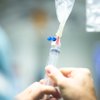Fritextsökning
Artiklar per år
Innehållstyper
-

The race between new alzheimer’s drugs Kisunla and Leqembi heats up
Kisunla or Leqembi? The rivalry between Eli Lilly and Bioarctic is intensifying. Where one drug gains approval, the other falls behind. Here's a look at the markets where these competing treatments are currently available.
-

Virology professor on the threat from X: ”The next pandemic could be worse“
The question is not if, but when we will be affected by a new unknown virus that causes yet another pandemic. Are we sufficiently prepared? "Absolutely not!", responds virologist Niklas Arnberg.
-

The scientist behind Novo Nordisk's obesity success: “I never stopped believing in GLP-1”
It took several years of failures in GLP-1 before Lotte Bjerre Knudsen and her colleagues found the right path – but when they did, it was a true breakthrough. "We invested for 25 years while everyone else laughed at us. Now everyone wants to join the game," says Lotte Bjerre Knudsen, Chief Scientific Advisor at Novo Nordisk.
-

Icelandic pharmaceutical company Alvotech to list on Nasdaq Stockholm
One of Iceland's largest companies, the pharmaceutical firm Alvotech, has announced its intention to list on Nasdaq Stockholm.
-

FDA inför AI internt efter lyckat pilottest
Från den 30 juni ska samtliga enheter inom FDA använda AI internt. Det meddelar den amerikanska läkemedelsmyndigheten efter att en första pilotstudie precis avslutats.
-

Forskare ifrågasätter tidskriftssystemet: ”En prestigeekonomi”
Rovtidskrifter rotar sig i ett mycket bredare problem med opålitliga kvalitetsmått och förskönade uppfattningar om anseende. Det menar KI-forskaren Gustav Nilsonne, som helst hade sett att vetenskapliga tidskrifter skrotades helt. Det här är del tre i Life Science Swedens artikelserie om rovtidskrifter.
-

Cellavision belönas med näringslivspris
Blodanalysbolaget Cellavision tilldelas Lunds kommuns näringslivspris.
-

Hon är ny ordförande för Swedish Medtech
Tove Christiansson efterträder Åsa Ardesjö som ny ordförande för branschorganisationen Swedish Medtech.
-

New moves around Nykode's management – withdrawal of resignations
Norwegian Nykode Therapeutics is reinstating members of the management team who previously announced their resignations.
-

After the threat of tariffs – Novartis invests 230 billion in the USA
Pharmaceutical giant Novartis plans to invest 23 billion dollarsover the next five years to expand its production in the USA. The goal is for all medicines destined for the US market to be produced within the country.
-

FDA plans to replace animal testing with AI – “Paradigm shift”
The requirement for animal testing in drug development will be phased out and replaced by AI, according to an announcement by the FDA. The decision has been met with skepticism from the National Association for Biomedical Research.
-

”AI-teknologin är här – dags för industrin att ta rygg på Läkemedelsverket”
När Läkemedelsverket, som en av de första läkemedelsmyndigheterna i Europa, lanserade sin egen generativa AI-lösning – den lokalt driftade Regulus – sattes ett nytt riktmärke för hela branschen. Detta visar tydligt att det går att förena innovation och teknikutveckling med strikt regulatorisk efterlevnad, skriver Andreas Palmlund, expert på AI i reglerade miljöer på Coeye, i en debattartikel.
-

From pharmacist to life science podcaster – Magnus Lejelöv uses his voice as a tool
Magnus Lejelöv has more than 20 years of experience in the pharmaceutical industry and has conducted nearly two hundred interviews with healthcare professionals on his podcasts.
-

FDA vill ersätta djurförsök med AI – ”Paradigmskifte”
Krav på djurförsök vid läkemedelsutveckling ska fasas ut och ersättas med AI, meddelade FDA på torsdagen. Beskedet möts av skepsis från den nationella föreningen för biomedicinsk forskning.
-

Kry i stort ordbråk med regionen – ”Helt dysfunktionell byråkrati”
Nyligen hävde Region Skåne avtalet med Krys barnmorskemottagning i Malmö. På Linkedin slår Kry tillbaka mot kritiken i ett långt och ofiltrerat inlägg, som börjar med ordet ”Suck!”.
-

FDA’s Top Vaccine Official resigns – Issues sharp criticism of Kennedy
FDA’s Top Vaccine Official is leaving his post while simultaneously criticizing the country’s health secretary for allowing “misinformation and lies” to influence his views on vaccine safety.
-

Regiondirektör petas efter Millenniumfiaskot
Regionstyrelsen i Västra Götaland har meddelat att regiondirektören Håkan Sandahls anställning avslutas.
-

Success for Genmab's antibody-drug conjugate
The Danish company Genmab has received Japanese approval for its treatment for advanced or recurrent cervical cancer.
-

Vaccine skeptic David Geier to lead study on link to autism
The American government is to launch a study on whether vaccines cause autism – and has appointed a well-known vaccine skeptic to lead the analysis.
-

Several departures at the top at Nykode
Members of both the management and the board are leaving the Norwegian biotech company Nykode.
-

An organ seldom in the spotlight – but utterly vital
The kidneys consist of more than 40 types of cells and have more functions in the body than most people know. Julie Williams leads AstraZeneca’s work in preclinical research about kidney diseases. “They are probably one of the most complicated organs in the body, and I like a challenge”, she says.
-

Career coach on salaries: “There is no right or wrong”
What is a reasonable salary for my job? It's a question we all ask ourselves. But how important is a higher salary really? Career coach Tina Persson believes this is an important consideration.
-

A tiny animal with great importance
From the mythical Ganges River to the less sacred, but considerably cleaner waters in KI's aquariums in Solna. The little zebrafish has made an unconscious career – as an increasingly important model organism in medical research.
-

A new scientific event in Gothenburg
Life Science Sweden is holding an event in Gothenburg for the first time.